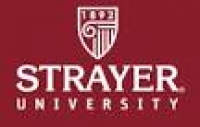






Online classes and on-campus coursework is designed to equip licensed practitioners with skills necessary to become mentors and advisors, leaders in their schools and communities, and advocates for change in the local, state, and national educational systems. Completion of Strayer University’s Master of Education program does not guarantee a student has met the requirements to apply for public school teacher or administrator licensure in any state, nor that a student will be eligible for pay raises, promotions or other job-related benefits. Students pursuing teacher or school administrator certifications in the public school system should contact their respective state offices of education as well as local school district to confirm educational requirements before beginning the program.
| Number | Duration |
|---|---|
| 1 | year |
* Examine leadership theories in relation to the K-12 school environment and society at large. * Formulate plans to design, develop, and lead the implementation of positive changes to improve K-12 instruction. * Utilize methods that promote awareness of and appreciation for diversity of ethnicity, culture, gender, and learning styles in K-12 instructional materials, program curricula, and assessment practices. * Determine appropriate technology applications designed to develop technological skills for teaching, learning, and leading in the K-12 school environment. * Utilize oral and written communication skills to present plans, program information, and assessment issues to K-12 stakeholders. * Develop skills, knowledge, attitudes, and values that are applicable to personal and professional development as a teacher and leader. * Apply research and critical thinking skills to obtain, analyze, synthesize, evaluate, and present scholarship related to issues in teacher leadership. * Use technology and information resources to research issues in teacher leadership. * Identify, prioritize, and act upon ethical issues inherent to teaching and learning in school settings. * Recognize appropriate leadership styles and strategies as they impact school environments. Use leadership styles and strategies to maximize learning and to analyze, synthesize, and evaluate scholarship related to technology in education. * Identify, prioritize, and act upon ethical issues inherent to the educational technology sector. * Recognize and utilize appropriate leadership styles and strategies as they impact educational technology issues.